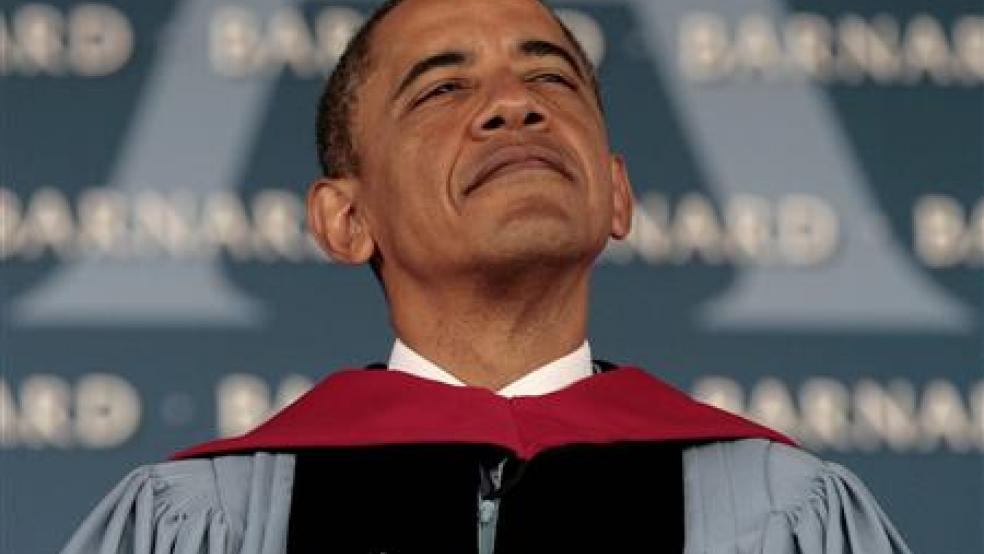WASHINGTON (Reuters) - For President Barack Obama's re-election team, it's sort of like threading a needle.
While trying to define Republican Mitt Romney as an insensitive job-killer during his time as a private equity executive, the Obama campaign also is raising money from private equity executives on Wall Street - and hoping voters don't see that as hypocritical.
The Obama campaign's political dexterity was evident on Monday, as it released a blistering video ad recounting how Romney's Bain Capital laid off 750 workers from a steel mill in Missouri. Hours later, the campaign raked in about $2 million at a Manhattan fundraiser held by Tony James, president of the Blackstone Group, a huge private equity firm.
The Blackstone Group had been on the Obama campaign's radar before - as a target for criticism.
Last month, the campaign identified a Blackstone partner, Paul Schorr, as one of "eight wealthy individuals" who donated to Romney's campaign after "betting against America" in "less-than-reputable" deals that led to outsourcing and layoffs.
So on Tuesday at the White House, Obama spokesman Jay Carney faced several questions about whether the president's campaign was setting a double standard in dealing with Wall Street, where some executives see Obama as anti-business.
Carney rejected the notion that Obama's team, in criticizing Romney and Republican donors in private equity, had been critical only of executives who had not contributed to Obama's campaign and that only those who support the president were "totally kosher," in the words of ABC's Jake Tapper.
Carney said that Obama's campaign was being critical of individuals, not an industry.
"There is absolutely a place for a vibrant and successful financial sector ... that includes private equity," Carney said.
NOT 'AGAINST PRIVATE EQUITY'
Carney's words were echoed by Bill Burton, who heads Priorities USA Action, a pro-Obama "Super PAC" that is spending $4 million to put out its own version of the anti-Romney ad released by Obama's campaign.
"The president isn't running against the private equity industry, he is running against Mitt Romney," Burton said. "Our ads ask whether the decisions Mitt Romney made creating incredible wealth for himself and his partners would make him a good president of the United States."
Not surprisingly, conservatives do not see it that way.
The Wall Street Journal published an editorial on Tuesday that chided Obama for attacking Romney's private equity work and then fundraising on Wall Street the same day.
The newspaper, an influential voice in conservative politics, said that those at the fundraiser, "many from the private equity world, paid $35,800 a head for the privilege of dining with the president who purports to loathe Wall Street when he isn't asking its greedy denizens to redistribute their wealth to his campaign."
FIRST IMPRESSIONS
Analysts said the attacks by Obama's campaign - and the counter-punching by Romney's team, which released a video ad showing workers from another Bain-owned steel plant praising Romney - were not surprising.
Although the election is more than five months away, the analysts said, this is a critical time in the campaign - especially for Romney.
Voters who were not focused on the Republican primaries may now be getting their first long look at Romney. So both campaigns are eager to create a lasting first impression of the Republican challenger to Obama.
"Some voters are just taking a first look at Romney, so the Obama campaign wants to shape the narrative," said Greg Valliere of Potomac Research group, which tracks political developments for investors. "Negative ads work. Romney should know, since he eviscerated (Republican rivals) Newt Gingrich and Rick Santorum with withering attack ads in the primaries."
Valliere questioned whether accusations that Obama is being hypocritical toward the private equity industry are likely to gain much traction with voters, who he said already are deeply distrustful of politics - and politicians.
"I think the irony is lost on the public," Valliere said. "Besides, he's a politician - what would you expect?"
Romney's campaign, which wants to focus the conversation on Obama's handling of the sluggish economy, said the president is trying to distract voters from his own record.
In a speech in Iowa on Tuesday, Romney blasted Obama as an overspending, "old-school liberal" whose economic policies are damaging the country and delaying critical decisions about government spending and debt.
"What President Obama is doing is not bold," Romney said. "It's old."
There were new signs on Tuesday of the challenge Obama could face at a time when the nation's unemployment rate is hovering at just above 8 percent and the economy is growing, but growing slowly.
A new USA Today/Gallup poll found that 55 percent of Americans expect the economy to get better during the next four years if Romney wins the election, while only 46 percent said it would improve if Obama is re-elected.
And 27 percent expect the economy to get worse under a President Romney, compared with 37 percent who expect things would become more sour if Obama wins a second term.
(This story clarified language in 19th paragraph)
(Additional reporting by Kay Henderon in Iowa, Gregory Roumeliotis in New York and Eric Johnson in Chicago; Editing by David Lindsey and Philip Barbara)


